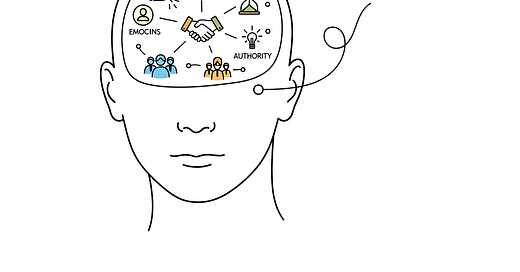The Psychology of Persuasion in Marketing Copy
Beyond words! Uncover the hidden psychological triggers that compel action, influence decisions, and transform passive readers into eager customers.
In the vast ocean of online content, why do some messages resonate deeply and drive action, while others simply fade into the background? The secret often lies not just in what is said, but in how it's said – by tapping into the powerful forces of human psychology. The Psychology of Persuasion in Marketing Copy isn't about manipulation; it's about understanding fundamental human behaviors and motivations to craft messages that genuinely connect, build trust, and guide prospects towards a beneficial decision.
Great marketing copy doesn't just inform; it influences. It appeals to our desires, alleviates our fears, and validates our choices. At Functioning Media, we believe that truly effective copywriting is built on a deep understanding of human nature. This guide will introduce you to the core psychological principles that underpin persuasive copy, helping you write messages that don't just get read, but get results.
Why Psychology is the Secret Ingredient in Marketing Copy 🤔
Ignoring the human mind in copywriting is like trying to sail without understanding the wind. Psychological principles are crucial because they:
Trigger Emotion: Emotions are primary drivers of purchase decisions. Psychology helps evoke the right feelings.
Build Trust & Credibility: Understanding how trust is formed allows you to incorporate elements that make your brand reliable.
Reduce Friction & Overcome Objections: Anticipating psychological barriers helps you address them proactively.
Increase Memorability: Messages that appeal to human biases or tell relatable stories are more likely to be remembered.
Compel Action: By appealing to innate desires and fears, you can gently nudge prospects towards conversion.
Create Resonance: People connect with messages that reflect their own thoughts, feelings, and experiences.
Key Psychological Principles for Persuasive Marketing Copy 🧠💡
Renowned psychologist Robert Cialdini's six principles of persuasion provide an excellent framework, though many other principles also apply:
1. Reciprocity: Give Before You Ask 🎁
Principle: People feel compelled to return favors. If you give something of value first, they are more likely to give back.
In Copy: Offer free resources (ebooks, templates, webinars, free trials, valuable blog content) without immediate expectation of a sale.
Example: "Download our FREE guide to boost your SEO – no strings attached!" (Leading to a feeling of obligation to consider your services later).
2. Scarcity: The Allure of Limited Availability ⏳
Principle: Opportunities seem more valuable when their availability is limited. Fear of missing out (FOMO) is a powerful motivator.
In Copy: Use phrases like "Limited stock," "Offer ends soon," "Only X spots left," "Last chance," "Exclusive access."
Example: "Enrollment closes Friday! Don't miss your chance to join our exclusive coaching program."
3. Authority: Trust the Experts 👩🎓
Principle: People are more likely to follow the advice of credible, knowledgeable experts.
In Copy: Highlight credentials (e.g., "Award-winning agency," "Ph.D. in X"), display certifications, cite reputable sources, feature expert testimonials, or showcase industry awards.
Example: "Developed by leading neuroscientists, our formula is clinically proven to enhance focus."
4. Consistency & Commitment: Small Steps Lead to Big Ones 🚶♀️
Principle: Once people commit to something (even a small commitment), they are more likely to follow through on larger, consistent actions to align with that initial commitment.
In Copy: Encourage small initial commitments (e.g., signing up for a free newsletter, taking a short quiz, downloading a free sample). Then, build on that commitment.
Example: "Start with our free 5-day challenge, and discover how easy it is to transform your habits."
5. Liking: We Say Yes to People We Like 👍
Principle: We are more likely to be persuaded by people (or brands) we like, who are similar to us, or who compliment us.
In Copy: Use a friendly, empathetic, and relatable tone. Tell stories that resonate with your audience's values. Use positive language and compliments. Highlight shared goals or challenges.
Example: "We understand the daily challenges you face..." (showing empathy and similarity).
6. Social Proof: Follow the Crowd 👥
Principle: People are more likely to do something if they see others doing it, especially if those "others" are similar to them.
In Copy: Feature testimonials, customer reviews, case studies, client logos, number of users/customers, celebrity endorsements, or "bestseller" labels.
Example: "Join 10,000+ satisfied customers who have transformed their businesses with our software."
Other Powerful Psychological Triggers in Copy
Fear of Loss (Loss Aversion): People are often more motivated by the fear of losing something than by the prospect of gaining something of equal value.
Example: "Don't lose out on potential customers," "Avoid costly mistakes."
Anticipation: Building excitement for what's coming.
Example: "Get ready for a revolutionary tool...", "Coming soon..."
Curiosity Gap: Creating a gap between what the reader knows and what they want to know.
Example: "The one mistake preventing your success..."
Pain-Agitate-Solution (PAS): Identify a pain, agitate it by showing its consequences, then present your solution.
Example: "Are you tired of skyrocketing ad costs? (Pain) Every penny wasted means fewer sales and slower growth. (Agitate) Our new AI targeting system slashes your ad spend by 30% without sacrificing leads. (Solution)"
At Functioning Media, we don't just write copy; we engineer conversations that convert. By deeply understanding your audience and applying these proven psychological principles, we craft marketing messages that resonate, build trust, and inspire action, ensuring your brand stands out and drives tangible results.
Ready to unlock the persuasive power of psychology in your copy? Visit FunctioningMedia.com for expert copywriting services that convert, and subscribe to our newsletter for more deep dives into marketing psychology!
#CopywritingPsychology #Persuasion #MarketingCopy #PsychologyOfMarketing #ConsumerBehavior #ConversionCopywriting #EmotionalMarketing #SalesPsychology #DigitalMarketing #FunctioningMedia





